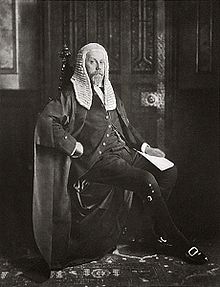James Lowther, 1st Viscount Ullswater
James William Lowther, 1st Viscount Ullswater (born April 1, 1855 in London - † March 27, 1949 ) was a British politician of the Liberal Party and speaker of the House of Commons .
Family and career
Lowther came from a politically active family. His grandfather William Lowther, 1st Earl of Lonsdale , as well as his father William Lowther, his younger brother Major General Cecil Lowther and his son Christopher William Lowther were members of the House of Commons for several years.
After attending school at Eton College , he studied law at King's College London and Trinity College (Cambridge) . In 1879 he was admitted to the bar . In 1906 he became a senior member (Bencher) of one of the four traditional bar associations ( Inns of Court ), the so-called Inner Temple .
Political career
MP
He began his political career in 1883 when he was elected a member of the lower house. There he initially represented the interests of the Rutland constituency until 1885 . In 1885 he ran unsuccessfully for the Mid-Cumberland constituency , but was elected for the Penrith constituency in 1886 . He represented this constituency in the lower house until its dissolution in 1918. From 1918 to 1921 he was finally a Member of the House of Commons for the newly created constituency of Penrith- Cockermouth . In 1887 he was briefly chairman of the Charity Commission, which was subordinate to the House of Commons.
Speaker of Parliament
In 1889 he became deputy chairman of the budget committee. After he was Undersecretary of State in the Foreign Office from 1891 to 1892 and as such a participant in an international conference in Venice in 1892, he first became Chairman of the Budget Committee (Ways and Means) for ten years in 1895 and thus also First Deputy Speaker of the House of Commons. In 1898 he was appointed a member of the Privy Council (PC).
Subsequently, he was in 1905 as the successor to William Gully speaker ( Speaker ) of the House of Commons. He held this office until his resignation in 1921. He was succeeded as Speaker of the House of Commons by John Henry Whitley .
As a speaker, the quote has been passed down from him: “ There are three golden rules for Parliamentary speakers: Stand up. Speak up. Shut up. ” (“There are three golden rules for parliamentary speakers: Stand up! Speak louder! Shut up ! ") (1917)
During his tenure as Speaker of the House of Commons, he was also chairman of the Buckingham Palace conference on the partition of Ulster in 1914 during World War I , chairman of the conference on electoral reform from 1916 to 1917, and in 1917 chairman of the commission on the definition of the borders between Great Britain and Ireland . After the First World War, in his role as speaker in 1918, he was also chairman of a royal commission and in 1919 a conference on regionalization.
Member of the House of Lords and other public offices
After his resignation as speaker, he was raised to hereditary nobility in 1921 . He then led the title of Viscount Ullswater , of Campsea Ashe in Suffolk , and was, as such, the upper house ( House of Lords on).
He also remained a respected political figure as a member of the House of Lords. From 1921 to 1922 he was chairman of the Royal Commission on the Government of London , 1923 to 1924 of the Evaluation Commission for Political Honors and in 1923 of the Constitutional Commission of Cambridge University . Between 1922 and 1931 he was one of the Trustees of the British Museum . In 1924 he was also the representative of Great Britain at the International Conference on Emigration in Rome . From 1925 until his death he was also trustee of the National Portrait Gallery (London) .
From 1929 to 1930 he was chairman of the joint committee of the upper and lower houses on electoral reform. From 1930 to 1940 he was chairman of the authority for determining agricultural prices and in 1935 of the BBC committee of inquiry.
Awards
In 1921 he was awarded the Knight Grand Cross of the Order of the Bath (GCB). In addition, the University of Oxford awarded him an honorary doctorate in law ( LL.D. ) and the University of Cambridge and the University of Leeds honorary doctorates in civil law (DCL).
Publications
Web links
- Biography
- Lowther, James William . In: Meyers Konversations-Lexikon . 4th edition. Volume 19, Verlag des Bibliographisches Institut, Leipzig / Vienna 1885–1892, p. 605.
| predecessor | Office | successor |
|---|---|---|
| New title created |
Viscount Ullswater 1921-1949 |
Nicholas Lowther |
| personal data | |
|---|---|
| SURNAME | Lowther, James, 1st Viscount Ullswater |
| ALTERNATIVE NAMES | Ullswater James Lowther, 1st Viscount |
| BRIEF DESCRIPTION | British Liberal Party politician, Member of the House of Commons and Speaker of the House of Commons |
| DATE OF BIRTH | April 1, 1855 |
| PLACE OF BIRTH | London |
| DATE OF DEATH | March 27, 1949 |
